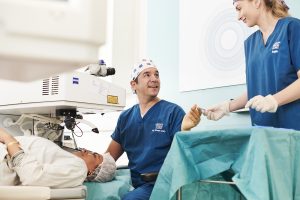Treatable Eye Conditions: Hyperopia (Long-Sightedness)
Hyperopia (long-sightedness) is one of the most common refractive errors. It is estimated to affect around one-fifth of the UK population. In fact, most babies begin life with hyperopia; however, its severity tends to decrease as we get older and many people will grow out of the error altogether. In others, hyperopia will remain or even develop over time and will likely require them to wear glasses when they are older.
But what exactly is hyperopia?
In individuals with hyperopia, the eyeball or cornea is shorter and flatter than it should be. This affects the focusing power of the cornea, causing it to focus light at a point beyond the retina (the photosensitive layer at the back of the eye) rather than directly on it. The result is blurry near vision.
Some people with hyperopia may be able to bring their near vision into focus with conscious effort; however, this strain can cause headaches and eye fatigue. Furthermore, as hyperopic patients get older, they may also start to notice a deterioration in their distance vision.
“My prescription was very unique being very long sighted and having a large astigmatism, so when I was told I was eligible for surgery at LVC I was very pleased. The procedure itself could not have gone more smoothly and it has absolutely changed my life being glasses and contact free. Strongly recommend!”
– Christie
Treating Hyperopia with Laser Eye Surgery
As mentioned above, many long-sighted patients will find that their vision deteriorates over time. While this is an expected feature of hyperopia, it can be frustrating for those who have never previously required glasses or contact lenses. Thankfully, many cases of hyperopia are easily treatable with Laser Eye Surgery.
At London Vision Clinic, we can correct long-sightedness with PRK/LASEK, LASIK, or Find out if you are a suitable hyperopia candidate for Laser Eye Surgery at the London Vision Clinic.
Our results with hyperopia
Our long-sighted patients perform exceptionally well compared to the data published in scientific literature or presented at major medical conferences.
Over 98% of our long-sighted patients achieve 20/32 vision – better than the UK driving standard of 20/40. Our results for hyperopia patients with prescriptions of up to +2D are even better: 97% of them achieve 20/20 vision.
View our latest hyperopia results for more.
If you’d like to learn more about our treatments for hyperopia (long-sightedness), get in touch with one of our friendly clinic coordinators or Book a Consultation today.



